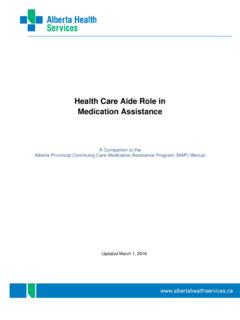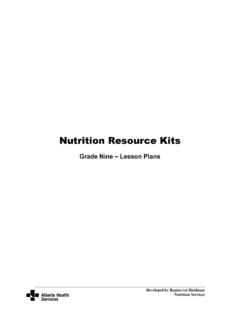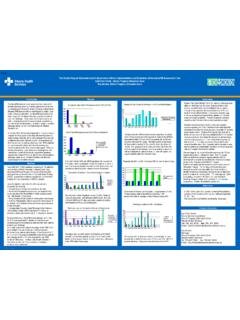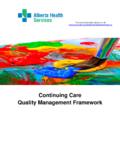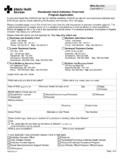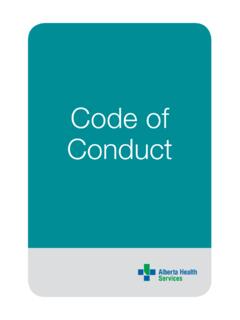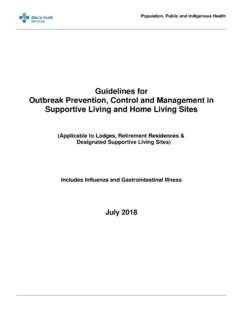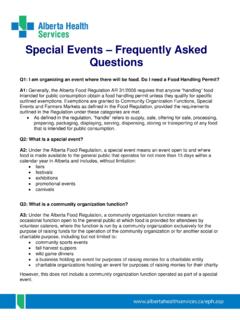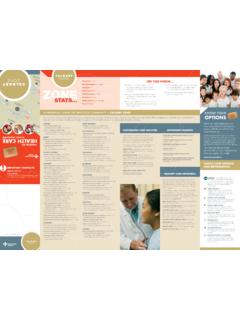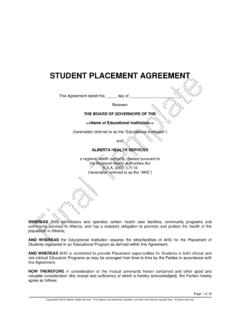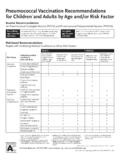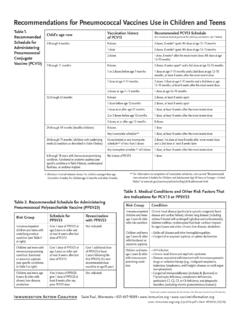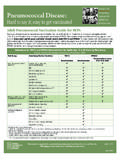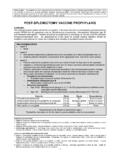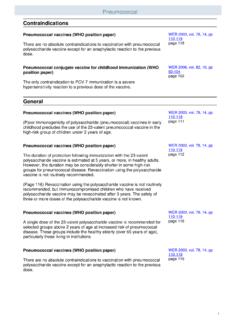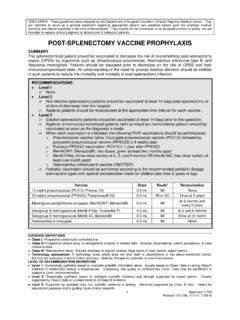Transcription of Pneumococcal Polysaccharide Clinical Guidelines
1 1 Alberta Health Services Immunization Program October17, 2014 Pneumococcal Polysaccharide Immunization Clinical Guidelines 2014/2015 Pneumococcal Polysaccharide vaccine is used to prevent serious illness caused by the Streptococcus pneumoniae bacteria. The immunization program was implemented nationally in 1998. The vaccine is provided throughout the year by Public Health or community providers. The influenza season presents an excellent opportunity to assess and immunize eligible persons who have not previously received this immunization or those who require a one-time single reinforcing dose. 1. vaccine Composition Pneumococcal Polysaccharide vaccine provides protection against 23 of the most prevalent or invasive serotypes of Streptococcus pneumoniae.
2 The vaccine contains highly purified capsular Polysaccharide antigens from the following 23 serotypes of Streptococcus pneumoniae: 1, 2, 3, 4, 5, 6B, 7F, 8, 9N, 9V, 10A, 11A, 12F, 14, 15B, 17F, 18C, 19A, 19F, 20, 22F, 23F and 33F. Pneumovax 23 (manufactured by Merck Frosst) is the provincially-funded product. 2. Indications Alberta Health (AH) provides Pneumococcal Polysaccharide vaccine to Alberta Health Services (AHS) for distribution and administration to individuals eligible to receive the vaccine free of charge. Individuals eligible to receive provincially funded vaccine are as follows: I. Routine Recommended Immunization Persons 65 years of age or older II. Medically at Risk Persons 24 months of age up to and including 64 years of age with the following: o Alcoholism; includes individuals with any history of alcohol abuse o Anatomic or functional asplenia, splenic dysfunction o Chronic heart disease; includes congestive heart failure, myocardial infarction and individuals taking heart medications or being followed by a cardiac specialist o Chronic cerebrospinal fluid (CSF) leak o Chronic kidney disease; includes nephrotic syndrome and renal dialysis o Chronic liver disease.
3 Includes chronic hepatitis B, hepatitis C and cirrhosis due to any cause o Chronic lung disease (including asthma requiring medical treatment within the last 12 months regardless of whether they are on high dose steroids) o Chronic neurologic conditions that may impair clearing of oral secretions o Cochlear implant (candidates and recipients) o Congenital immune deficiencies involving any part of the immune system, including B-lymphocyte (humoral) immunity; T-lymphocyte (cell) mediated immunity; complement system (properdin or factor D deficiencies); or phagocytic functions. 2 Alberta Health Services Immunization Program October 17, 2014 o Diabetes mellitus; includes both insulin and non insulin dependent (controlled by oral medication or diet) o HIV infection o Illicit injection drug use o Immunosuppressive therapy including use of long term corticosteroids, chemotherapy, radiation therapy, post-organ transplant therapy and certain anti- rheumatic drugs: o Malignant neoplasms including leukemia, Hodgkin s and non-Hodgkin s lymphomas, multiple myeloma and other malignancies o Sickle cell disease and other hemoglobinopathies Solid Organ Transplant (SOT) candidates and recipients and Hematopoietic stem cell (HSCT) recipients 24 months of age and older See Standard for Immunization of Transplant Candidates and Recipients # III.
4 High Risk Setting Individuals 24 months up to and including 64 years of age who are homeless or living in chronically disadvantaged situations o Includes those with no fixed address or living in shelters Individuals 24 months up to and including 64 years of age who are residents of Long Term Care or Continuing Care facilities (if the individual does not have a chronic health condition) A one-time single reinforcing dose of Pneumococcal Polysaccharide vaccine is recommended ONLY for those individuals at highest risk of invasive Pneumococcal disease. This includes people with: Functional or anatomic asplenia, splenic dysfunction, or sickle-cell disease Chronic renal failure or nephrotic syndrome Hepatic cirrhosis HIV infection Immunosuppression related to disease or therapy ( lymphoma, Hodgkin s disease, multiple myeloma, high-dose systemic steroids) Solid organ transplant A one-time single reinforcing dose of Pneumococcal Polysaccharide vaccine should be given: 3 years after the initial dose of Pneumococcal Polysaccharide vaccine if the client was 2 to 10 years of age at the time of the initial dose.
5 5 years after the initial dose of Pneumococcal Polysaccharide vaccine if the client was 11 years of age or older at the time of the initial dose. The need for subsequent reinforcing doses has not been determined and is not routinely recommended at this time. 3. Administration and Dosage Pneumococcal Polysaccharide vaccine (Pneumovax 23) is supplied as a single dose vial. One primary dose of Pneumococcal Polysaccharide vaccine is sufficient for most individuals. Two doses are required for HSCT recipients. The recommended dosage for individuals 2 years of age and older is mL. 3 Alberta Health Services Immunization Program October 17, 2014 Pneumococcal Polysaccharide vaccine can be administered subcutaneously (SC) or intramuscularly (IM).
6 Past experience has shown that there are fewer local reactions following IM administration of this vaccine . The deltoid muscle is the recommended site for administration. Pneumococcal vaccine may be given at the same time as influenza vaccine . When administering two (2) vaccines at the same time, best practice is to use different limbs. This may not be feasible ( mastectomy clients) and in these instances the same limb may be used; however a different site on the limb should be chosen. A different administration set ( , needle, syringe) must be used. Contrary to product monograph information, the Canadian Immunization Guide (Evergreen Edition) advises that PNEUMOVAX 23 vaccine may be administered concomitantly with ZOSTAVAX.
7 Although one study showed slightly lower antibody titres when ZOSTAVAX vaccine was given simultaneously with Pneumococcal 23-valent Polysaccharide vaccine , its Clinical significance is unclear. There is a benefit to giving the two vaccines concomitantly and not risking a lost opportunity to give vaccine to someone who may not return for follow up. Special consideration needs to be given to clients undergoing splenectomies, transplants or immunosuppressive therapy. The timing of Pneumococcal Polysaccharide vaccine ideally should occur 14 days prior to surgery or at least 14 days prior to initiation of immunosuppressive therapies ( chemotherapy). Check your local protocol for clients who are unsure of past Pneumococcal Polysaccharide immunization history.
8 Pneumococcal conjugate vaccine is provided routinely to: All children 2 months up to and including 71 months of age. Children and adults with specific chronic health conditions (see Standard for Pneumococcal 13-valent Conjugate vaccine # ) When Pneumococcal conjugate vaccine is also indicated, it is recommended that the conjugate vaccine series/dose be completed/given prior to administering the Pneumococcal Polysaccharide vaccine . These individuals should be referred to a Public Health Centre to receive the vaccine . 4. Contraindications Pneumococcal Polysaccharide vaccine should not be given to individuals who: have had an anaphylactic reaction to a previous dose of this vaccine . have a known severe hypersensitivity to any component of the vaccine (Pneumovax 23: phenol and saline).
9 Are less than 2 years of age. present with a serious acute febrile illness. Recommendations should be provided for these individuals to be immunized when their symptoms have resolved. Individuals with non-serious febrile illness may be immunized. 5. Reactions Reactions to Pneumococcal Polysaccharide vaccine are usually mild. Side effects following immunization can include: I. Local Reactions Redness, tenderness and/or swelling at the injection site lasting 3-4 days. 4 Alberta Health Services Immunization Program October 17, 2014 II. Systemic Reactions Low grade fever, headache and general malaise beginning soon after immunization and usually resolving within 24 hours. Studies have shown an increase in local and systemic reactions when re-immunization occurs less than 2 years after initial dose of vaccine .
10 6. Adverse Reaction Reporting The following immunization reactions are reportable to AHS local Public Health as per the Alberta Health Guidelines : Local reactions are reportable if: 1. the onset of swelling is within 48 hours following immunization; AND 2. swelling extends past the nearest joint OR severe pain that interferes with the normal use of the limb lasting greater than 4 days OR reaction requires hospitalization Anaphylaxis is reportable if it occurs within 24 hours following immunization. Any other reaction outside of what is normally expected and cannot be attributed to coexisting conditions should be reported. Consult with AHS local Public Health as soon as possible for any case where there is uncertainty as to whether a symptom following immunization is related to the immunization.
